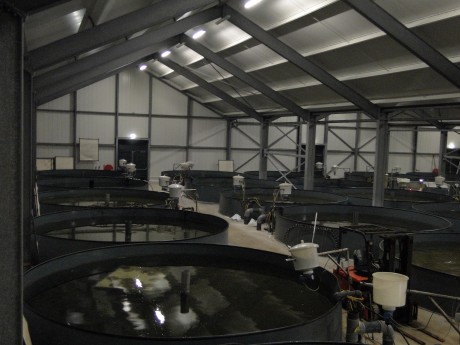Groenten- en Viskwekerij Cornelisse B.V. (Grovisco) is a fish farm, specialised in farming turbot (Scophthalmus maximus) (Psetta maxima) and salty vegetables sea aster (Aster tripolium) and glasswort (Salicornia europaea). The company is located near Stavenisse at the island of Tholen in the province Zeeland. This is in the south-west of the Netherlands.
The fishfarm
The first phase of the fishfarm was established in November 2006 and has a production capacity of around 70 tonnes turbot per year. The building itself has a capacity for expanding towards 200 tonnes per year. The turbot is cultured in a Recirculation Aquaculture System (RAS). Recirculation means that the water is used several times and is continiously filtered. With this technique is the water use minimal and much less than the flowthrough systems (these are often used in South Europe). In the flowthrough systems, the water is only used once. In our RAS we lost only 10% water per day, due to refreshment and evaporation.
Turbot is a marine specie, so the water we use has a high salt content (slightly less than seawater). The water is pumped from a depth of 250 – 300 meters deep and has an excellent quality for farming turbot. The main advantages for using groundwater are the constant temperature, abscence of pathogens, bacteria, fungae and algae. Maintaining water quality in the farm is very important for the health and welfare of the fish. Temperature, oxygen and pH is controlled continiously and other important parameters, such as nitrite, nitrate and ammonia, are regurarly measured.
Salty vegetables
In Februari 2005 we started with preparing beds for cultivating salty vegetables. PE-foil in the ground is needed to prevent the influence of salt water into the environment. With these beds we avert salinisation of the soil and there is a relative low amount of water used. The salt content of the soil in these beds is adjustable; irrigation with salt water or fresh water, that is stored in a bassin (rainwater). The Sea Aster and Glasswort are salty vegetables, but they cannot handle too much salt. Especially in spring with the germination of these crops, it is very important that there is enough fresh water available.
Sustainability
The wastewater from the fish farm is used to irrigate the salty vegetables. In this way, we link the two parts of our company to each other in a sustainable use of water and nutrients. The plants use the nutrients in the wastewater of the fish farm very effective and has a minimal requirement for fertilizer. After several years of practical research and adjustments in the culture methods, we are able to deliver exclusive and sustainable products. Besides the production of our high quality products, we always aim for optimization in the fishfarm process and the vegetable cultivation.


 English
English Deutsch
Deutsch Nederlands
Nederlands